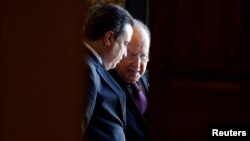TUNIS —
Tunisia's national assembly on Thursday approved a new electoral law, to take one of the last steps in the country's move to full democracy after the 2011 uprising that inspired the "Arab Spring" revolts.
Passing the law allows electoral authorities to set a date for the first election since the North African state adopted a new constitution that has been praised as a model of democratic transition in the Arab world.
Members of the 217-seat assembly voted 132 in favor and 11 against the new electoral law.
"This is an important step," said Mehrzia Labidi, vice president of the assembly.
With its new constitution and a caretaker administration governing until elections later this year, Tunisia's relatively smooth progress contrasts with the turmoil in Egypt, Libya and Yemen, which also ousted long-standing leaders three years ago.
After former autocrat Zine El-Abidine Ben Ali was toppled, Tunisia struggled with a deepening divide over the role of Islam in one of the most secular countries in the Arab world.
Islamist party Ennahda won the first free election after Ben Ali's fall and formed the first government, but the assassination of two secular opposition leaders triggered political crisis.
Ennahda and its main rival Nidaa Tounes reached a compromise that called for the Islamist party to step down and the new constitution to be finished to clear the way for elections.
The electoral law debate was clouded by disagreements over a proposed measure that would have excluded former Ben Ali officials from running for office. The Nidaa Tounes movement is headed by a former parliament speaker under Ben Ali.
But even Ennahda opposed the exclusion measure, as a way to ensure Tunisia's transition to democracy was completed, party leader Rached Ghannouchi told Tunisian television.
"The rejection of political explusion sends a strong message that our revolution continues, without revenge," said Khemais Kessila, of Nidaa Tounes. “It shows that we are avoiding any divisions.”
Battling Islamist militants and tackling public spending to reduce the deficit are two major challenges for the caretaker government of Prime Minister Mehdi Jomaa, who has been welcomed by international partners and financial lenders.
Passing the law allows electoral authorities to set a date for the first election since the North African state adopted a new constitution that has been praised as a model of democratic transition in the Arab world.
Members of the 217-seat assembly voted 132 in favor and 11 against the new electoral law.
"This is an important step," said Mehrzia Labidi, vice president of the assembly.
With its new constitution and a caretaker administration governing until elections later this year, Tunisia's relatively smooth progress contrasts with the turmoil in Egypt, Libya and Yemen, which also ousted long-standing leaders three years ago.
After former autocrat Zine El-Abidine Ben Ali was toppled, Tunisia struggled with a deepening divide over the role of Islam in one of the most secular countries in the Arab world.
Islamist party Ennahda won the first free election after Ben Ali's fall and formed the first government, but the assassination of two secular opposition leaders triggered political crisis.
Ennahda and its main rival Nidaa Tounes reached a compromise that called for the Islamist party to step down and the new constitution to be finished to clear the way for elections.
The electoral law debate was clouded by disagreements over a proposed measure that would have excluded former Ben Ali officials from running for office. The Nidaa Tounes movement is headed by a former parliament speaker under Ben Ali.
But even Ennahda opposed the exclusion measure, as a way to ensure Tunisia's transition to democracy was completed, party leader Rached Ghannouchi told Tunisian television.
"The rejection of political explusion sends a strong message that our revolution continues, without revenge," said Khemais Kessila, of Nidaa Tounes. “It shows that we are avoiding any divisions.”
Battling Islamist militants and tackling public spending to reduce the deficit are two major challenges for the caretaker government of Prime Minister Mehdi Jomaa, who has been welcomed by international partners and financial lenders.












